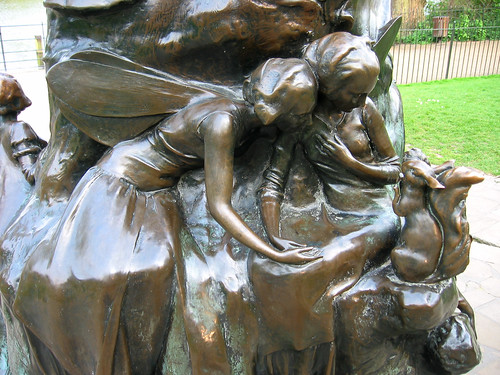
{Photo by rocketlass.}
Fresh off Sunday's post about Virginia Woolf, today I'll direct you to Lev Grossman's article about Leonard Woolf, "The Death of a Civil Servant," in the May issue of the Believer.
The essay is built around Woolf's time as a young civil servant in Ceylon, and this description of what he found when he arrived will give you a good idea of how well Grossman makes use of interesting details from Woolf's autobiographical writings:
Ceylon was a giant step forward into adulthood and independence for Woolf, but it was also a great leap backward--backward in time. Ceylon had yet to enter the twentieth century, at least as it was known in the Western world. "Before the days of the motor-car," Woolf wrote, "Colombo was a real Eastern city, swarming with human beings and flies, the streets full of flitting rickshas and creaking bullock carts, hot and heavy with the complicated smells of men and beasts and dung and oil and food and fruit and spice." The alien heat and gargantuan insects appalled Woolf. The day after he arrived he was reunited with [his terrier] Charles at the docks. Charles promptly peed on a passerby, who seemed not at all troubled by this, then threw up from the emotion and the sun. Crows flew down to eat the vomit. Welcome to Ceylon.Grossman tells of Woolf's awkward friendship with another colonial official, a policeman and would-be poet and intellectual, B. J. Dutton, and he uses that friendship--and Woolf's near-horror at Dutton's fairy-and-fantasy-filled poems--as the ground from which to argue a convincing, fascinating case for modernism and fantasy as dark twins, born of the same moment and reacting to the same changes in society. As Grossman puts it,
Fantasy is a prelude to the apocalypse. Modernism is the epilogue.That Grossman has a deep knowledge of and interest in fantasy won't surprise any readers of his novel from last year, The Magicians, in which a young man who has long dreamed of escaping into a fantasy world gets his chance--only to discover that the problems and weaknesses and disappointments and betrayals of ordinary life are not, after all, particularly amenable to magic. As Grossman puts it in his Believer piece,
Much of fantasy literature arises from this essential truth: that magic is not the end of all your problems, it's the beginning. Travel deeper into the realms of gold--farther up and farther in, as Aslan says--and you leave reality behind, but only to re-encounter it in transfigured form.Given Grossman's nuanced understanding of fantasy, what's odd about The Magicians is that the occasional frustrations in this otherwise very satisfying novel seem to come from Grossman's rejection of one of the now-standard characteristics of fantasy literature: the carefully balanced, multi-book story arc. It's as if, because there can be no truly heroic quest in The Magicians, because the world--even, or perhaps especially, the magic world--simply isn't like that, then the story itself can't be made to fit the same the heroic shape we're used to. The result is that portions of the novel feel compressed, bits of its impressively imaginative world-building more suggested than fully worked out: the relationship, for example, between the magic school of Brakebills Academy and the larger world; or the mostly alluded-to post-graduate careers of its alumni; or the faculty, who are so intriguing a group that you wish they were allotted more space. A sequel apparently is in the works, and perhaps Grossman will flesh out some of these aspects in its pages, but within The Magicians itself I felt the lack.
All of which is not to take away from Grossman's achievement: The Magicians is completely captivating, and it's absolutely crammed with creative, surprising ideas and inventions, nearly all of which cohere impressively. A magical ordeal that involves a transformation from human into animal is wonderfully rendered, convincing in its depiction of the physical and mental alterations alike. The admission exam taken by potential students is simultaneously jaw-dropping and totally believable in its context--it's hard to imagine anyone who remembers being a talented student not smiling at its challenges (and sort of wishing they could take a crack at it). And a scene where an evil creature unexpectedly emerges in a classroom is one of the most intense and frightening scenes I've ever read. I read the book soon after it was published last spring, and it's stayed with me; now I'm impatient for the sequel.
{While you're waiting, you could do worse than to pick up the May Believer--the Grossman piece alone is worth the price of admission!}
Interesting. I think that there is a new biography of Leonard Woolf either quite recently released or coming out soon.... Would be interesting to compare.
ReplyDeletethanks for sharing
Hannah
The piece on Mimesis was delivered with a youthful aplomb, I might add.
ReplyDelete